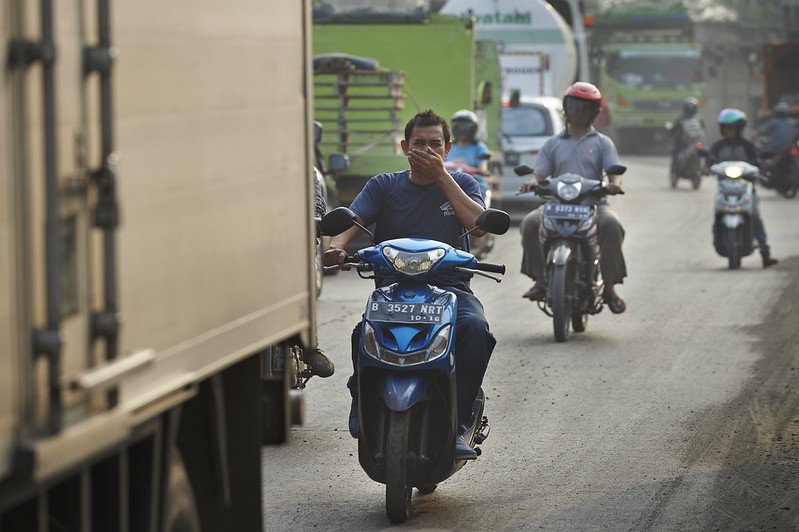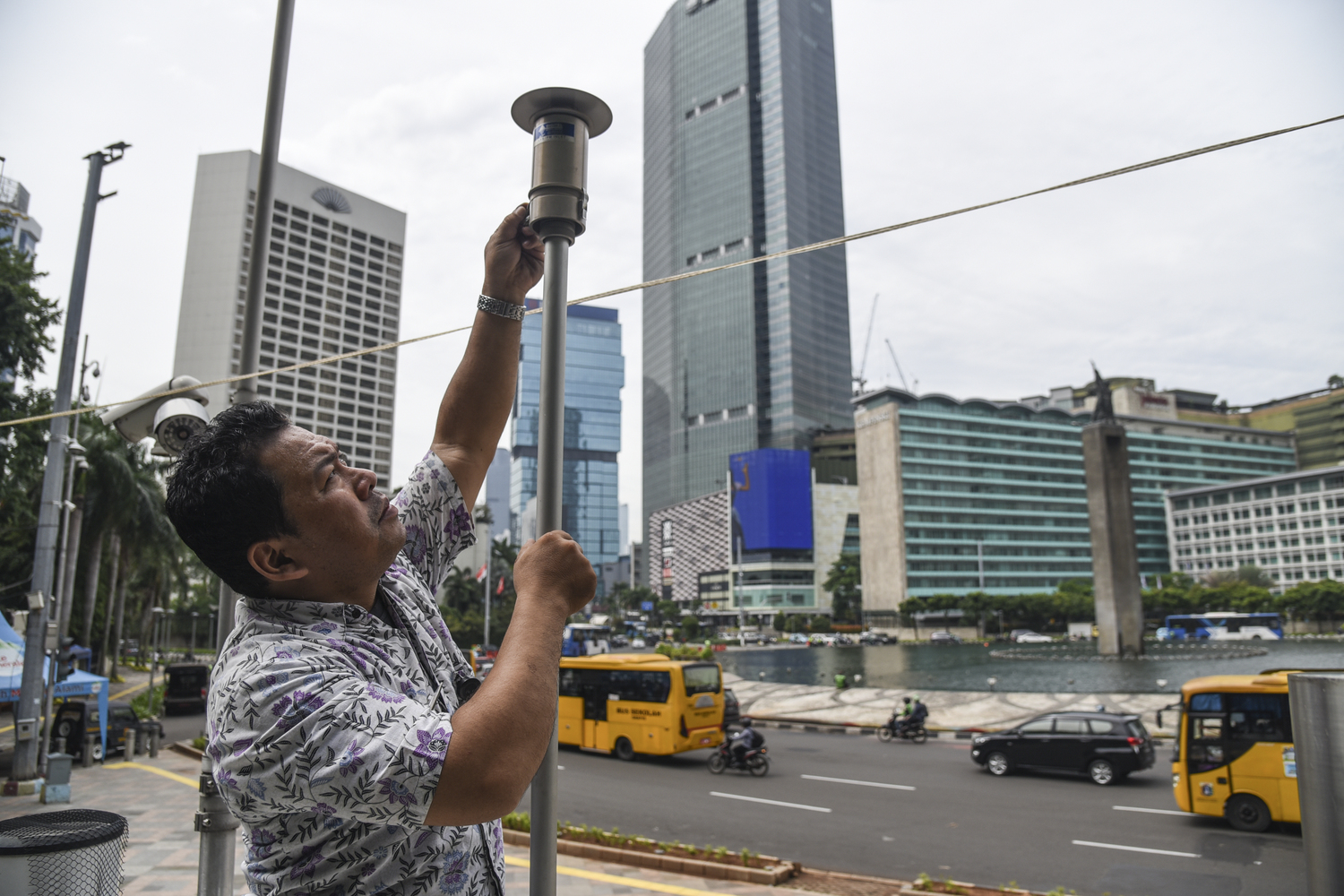Vital Strategies was incorporated in Singapore in 2017 as a regional hub for the Asia Pacific region. A culturally, economically and politically diverse region of 47 countries and territories, the Asia Pacific region faces a variety of public health challenges as a result of emerging economies, population growth and environmental threats. The 4.3 billion people (or 60% of global population) who call the region home are at risk—as tobacco use, air pollution, poor road safety and unhealthy diets contribute to millions of deaths each year.

We develop and implement targeted, evidence-based programs in critical areas such as air pollution, civil registration and vital statistics, data impact, the Partnership for Healthy Cities and road safety from India to Indonesia to the Solomon Islands.
With about 25 staff based in Singapore, and more than 100 staff and consultants in Asia Pacific, Vital Strategies is well-positioned to create partnerships with policymakers, administrators, funders, philanthropies, the media and civil society groups in order to build capacity and advance progress—directly impacting the health of millions of people.
Learn more about our work
Air Pollution and Health
Two-thirds of all global deaths from air pollution occur in Asia, according to the World Health Organization (WHO). Vital Strategies is working in Jakarta, Indonesia, where particulate matter levels far exceed WHO guidelines, to provide technical assistance in air pollution mitigation to the provincial government DKI Jakarta. At a national level, we partner with UNICEF to provide data on the threat of air pollution to children’s health. Through our technical guide, “Accelerating City Progress on Clean Air” Innovation and Action Guide”, launched in New Delhi, India in 2020, we help cities jumpstart near-term solutions to rapidly improve air quality.
In 2018, we published Hazy Perceptions, a comprehensive study on public perceptions and media reporting about air pollution in 11 countries across South and Southeast Asia, analysing 530,000 pieces of content over nearly four years. The study found a significant gap in public knowledge and a dire need to drive discussion toward demand for meaningful solutions.
Childhood Lead Poisoning Prevention
Lead is a potent neurotoxin that the body stores over a lifetime. It can severely affect the mental and physical functioning of children and the health of adults. The burden on health care systems and loss of human potential also affects the economic development of nations. Despite clear evidence of harm, many countries do not conduct active surveillance of lead poisoning, and just 35% of countries have legally binding limits on lead in paint.
The program has expanded to Indonesia, where Vital Strategies is partnering with UNICEF and Pure Earth to introduce a national clinical guidance for lead exposure in children, develop local action plans, community education, and a comprehensive assessment of lead policies, and to India and the Philippines where Vital Strategies is launching representative lead exposure surveillance programs with the governments.
Civil Registration and Vital Statistics (CRVS)
Vital Strategies’ Civil Registration and Vital Statistics program collaborates with governments to make sure every human life counts. CRVS systems are the foundation of good governance and are key to policy, planning and monitoring of international commitments such as the Sustainable Development Goals, and yet more than 100 low- and middle-income countries do not have fully functioning CRVS systems.
Since 2015, we have assisted countries such as Bangladesh and Sri Lanka to improve CRVS systems guided by the principles of country ownership, capacity building and sustainability. In the Philippines, since mid 2017, an automated system for coding death certificates processed nearly one million certificates — halving the time needed for policy makers to have access to cause-of-death data. In Bangladesh, an improved approach to civil registration with close involvement of the health sector, is boosting civil registration completeness. Our work continues to expand in Asia.
Data Impact
The Data Impact Program of the Bloomberg Philanthropies Data for Health Initiative collaborates with governments to improve the quality of public health data and strengthen the use of this data in public health policymaking in 20 countries and cities — eight of which are in Asia Pacific.
In the Philippines, through Data Impact’s capacity building with the Department of Health, policy recommendations led to improvements in regional water quality, local government initiatives to prevent tooth decay in children, and new efforts to collect better data on causes of maternal mortality. In Myanmar, Vital Strategies, in collaboration with the Ministry of Health and Sports, held a Data Leadership workshop which identified the need for a ministry-wide data review process. We also worked with national staff in Solomon Islands to train health information officers from all provinces to analyze, interpret and communicate data for public health decision-making.
NCD Management and Community Engagement
This 18-month project focuses on building a government-led ecosystem to support NCD prevention, screening and management in Lao PDR. This will include direct technical and strategic support to key health agencies at the national and sub -national level, building the skills, and competencies of healthcare professionals, managers, policymakers, and community health workers to implement comprehensive NCD screening and management programs. The initiative focuses on cardiovascular disease, hypertension and diabetes in Lao PDR and is powered by Sanofi’s Global Health Unit for Sustainable Impact.
Partnership for Healthy Cities
The Partnership for Healthy Cities is a global network of 70 cities committed to reducing noncommunicable diseases (NCDs) and injuries. Each city receives a seed grant, technical assistance and communications support to implement one of 14 interventions involving tobacco control, food policy, road safety, safe and active mobility, overdose prevention or surveillance.
Twenty-five cities in 19 Asia Pacific countries are part of the Partnership, including: Melbourne, Australia; Muscat, Oman; Seoul, South Korea; Dhaka, Bangladesh; Ulaanbaatar, Mongolia; Tokyo, Japan; Colombo, Sri Lanka; Amman, Jordan; Almaty, Kazakhstan; Bandung and Jakarta, Indonesia; Bangkok, Thailand; Ho Chi Minh City and Hanoi, Vietnam; Kuala Lumpur, Malaysia; Phnom Penh, Cambodia; Quezon City, Philippines; Yangon, Myanmar; Tianjin, Hong Kong SAR, Shenzhen, China; Kathmandu, Nepal; and Ahmedabad, Mumbai and Bengaluru, India. In Yangon, under the Partnership for Healthy Cities initiative, compliance with the smoke-free law has increased from 25% (in 2017) to 53% (in 2018) over a one-year period in a key downtown township — Kyauk-ta-da– creating a successful pilot model that is now being replicated across other townships in Yangon.
As of March 2020, the Partnership for Healthy Cities initiative has expanded and activated its network to respond to the COVID-19 pandemic. With COVID-19 spreading rapidly in urban centers around the globe, cities are at the forefront of the response to this unprecedented public health crisis. Additionally, those at greatest risk for the most severe COVID-19 complications are people with hypertension, diabetes, chronic lung and heart disease and other NCDs. A new Partnership for Healthy Cities COVID-19 Response Center offers the latest tools and technical resources geared toward urban challenges, ranging from maintaining city services to legal guidance on implementing critical public health measures, for cities at every stage of the pandemic.
Road Safety
Low- and middle-income countries experience some of the highest rates of road traffic injury and death. As part of the Bloomberg Philanthropies Initiative for Global Road Safety’s current phase (2020 to 2025), in the region, Vital Strategies is working in Malaysia, Vietnam, Bangladesh and India to strengthen road crash surveillance systems, and use outcome data to inform policy and action. Through the use of strategic communications and mass media campaigns, the Road Safety program pushes for behavioural change.
During this initiative’s previous phase (2015-2019), Vital Strategies also worked in Indonesia, Thailand and China. In Bandung, Indonesia, Vital Strategies worked with the municipal health department and hospitals to develop a road injury reporting system including training on the International Classification of Diseases so cases could be easily identified. This new reporting system can now give the city more accurate data, which will inform road safety policies and interventions in the future.
In Bangkok, the mass media campaign “Consequences,” paired with enforcement efforts, contributed to an increase in proper helmet use. In 2018, motorcycle passengers increased correct helmet use from 19% to 46%. Vital Strategies also worked with regional health ministry officials to collect and link data from forensic institutes, resulting in a doubling of the road traffic mortality count for the city. The Ministry of Public Health is now standardizing this additional reporting going forward, to better inform priorities and planning for crash prevention.
Urban Mobility
The UK Partnering for Accelerating Climate Transitions (UK PACT) project, funded by the U.K. Foreign, Commonwealth and Development Office, aims to assist the coastal cities of Surabaya and Makassar in their post-COVID recovery plans by developing a more sustainable urban mobility strategy that is lower in emissions, safer, more inclusive, and resilient. As part of a consortium with the World Resources Institute Indonesia and Arup, Vital Strategies will oversee the provision of end-to-end technical support and project implementation. This 3-year project will be delivered across and within Makassar and Surabaya, with links to provincial and national decision-making structures in Indonesia.
The primary focus for the project is on interventions that will aid in developing an urban mobility initiative to enhance safety and accessibility in these two cities, and to create safer and more accessible public transportation systems specifically tailored to meet the needs of women, persons with disabilities, and local communities.
USAID Working Together to Eliminate TB (USAID BEBAS-TB)
USAID BEBAS-TB is USAID’s flagship activity to improve the quality of tuberculosis case detection, diagnosis, care, and prevention with innovative solutions to collaboratively advance progress in TB control. In collaboration with MSH and other local partners, Vital Strategies will provide technical assistance to Indonesia’s National TB Program to improve the quality of TB service delivery by introducing and piloting new approaches and treatment regimens, while bringing international best practices to Indonesia. USAID BEBAS-TB works in four densely populated provinces with a high TB burden: North Sumatra, West Java, Central Java, and East Java.
Recent

Environmental Health Publication
Integrated Use of Low-Cost Sensors to Strengthen Air Quality Management
Read the reportContact Us
asiapacific@vitalstrategies.org
+65 6914 9826
6A Shenton Way, #04-01, Singapore 068815

